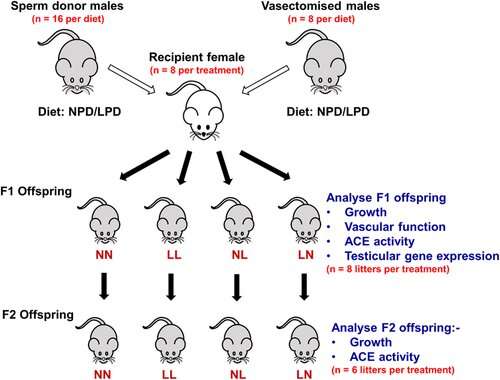A father's diet could affect the long-term heart health of his offspring

A new study has found that a lack of protein in a father's diet affects the quality of his sperm and in turn, could affect the long-term cardiovascular health of his offspring.
The study, carried out by experts from the University of Nottingham's School of Medicine and published in the Journal of Physiology, fed male mice a poor quality low protein diet which impaired the way blood vessels functioned in their offspring, a key indicator of heart disease.
Growing evidence indicates maternal diet and well-being at the time of conception can impact on offspring development, often leading to cardiovascular dysfunction and metabolic disease in later life. However, there has been little research into the impact of a father's diet and the effects this can have on the cardiovascular health of his offspring.
This new study bridges this gap in our understanding by using a mouse model to explore the long-term cardiovascular health of offspring from males fed a poor quality, low protein diet.
Mice were fed a controlled normal protein diet (18% protein) or low protein (9% protein) diet for a minimum of 7 weeks prior to conception. The results showed that the poor quality diet may have altered the genetic information carried in the sperm which changed the way blood vessels formed in the developing fetus, and so affected the cardiovascular function in the offspring.
The study also showed that the fluid the sperm are carried in, the seminal plasma, also influenced offspring cardiovascular health.
Dr. Adam Watkins, Assistant Professor in Reproductive Biology, and lead author of the study, said: "Our findings indicate that a poor quality paternal low-protein diet may have altered the genetic information carried in the sperm or the composition of the seminal plasma. Our study shows that a father's diet at the time of conception may affect how the blood vessels form, which then leads to permanent changes in how the blood vessels work, resulting in programmed cardiovascular ill-health in his offspring."
This latest research follows on from a previous study by the team published in PNAS, where the team looked at the impact of a low-protein diet on the father's offspring's long-term metabolic health.
The study found that males fed a low-protein diet produced sperm with fewer chemical tags on their DNA that regulate gene expression than mice fed a normal diet. Researchers also observed that the seminal plasma suppressed maternal uterine inflammatory and immunological responses, essential for a healthy pregnancy. The researchers believe that the health of a father's offspring is affected both by the quality of a father's genetic information passed on within the sperm at conception, and by the seminal plasma-primed maternal uterine environment in which the embryo will develop.
More information: Hannah L. Morgan et al. Paternal diet impairs F1 and F2 offspring vascular function through sperm and seminal plasma specific mechanisms in mice, The Journal of Physiology (2019). DOI: 10.1113/JP278270
















